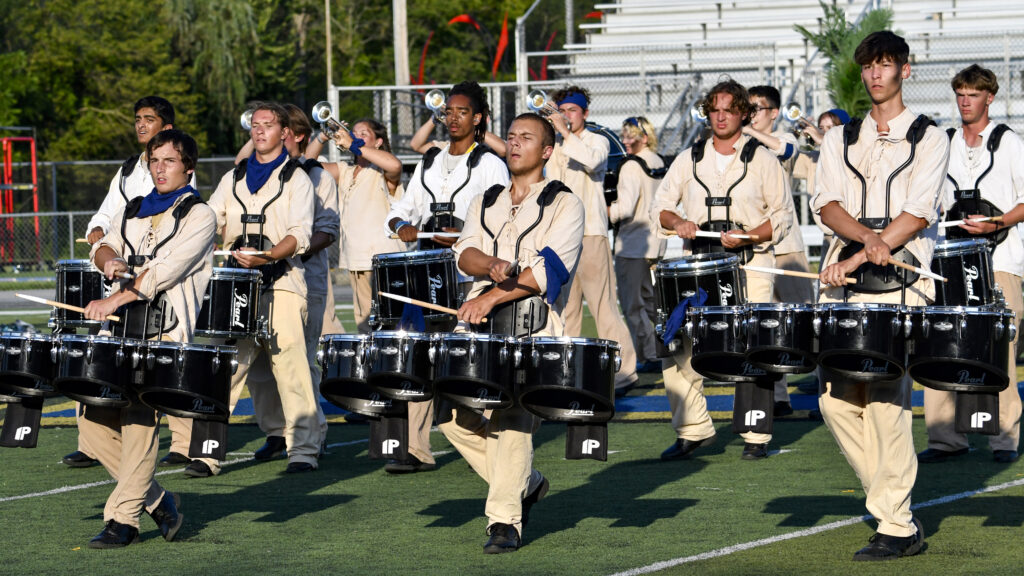
Those at the 1996 DCI World Championships at Orlando’s Citrus Bowl Stadium witnessed a tie for first place between the Blue Devils and Phantom Regiment and a tie for eighth place between Crossmen and Magic of Orlando. It was the first of a three-year partnership between DCI and Walt Disney World Resorts that would have DCI returning to Orlando for the next two years as well. DCI’s Individual and Ensemble competition and other events were held at Epcot on Walt Disney World property, helping the festivities take on a party atmosphere. Carolina Crown’s 10th-place production, “Chess and the Art of Strategy,” provided several of the most memorable visual moments of the season, with 32 huge chess pieces continually moving about the field. The show was largely set to music by two English composers, William Walton and Edward Elgar, and throughout the performance, the chess pieces advanced and retreated, one half the white side and the other half the black side. The show opened with “Tactical Fanfare,” a creation by the corps’ staff that was based on the militaristic drumming from “Toccata and Chorale” of Karel Husa’s famed “Music for Prague 1968.” Husa wrote the piece in reaction to the Soviet invasion of his native Czechoslovakia. The opposing chess pieces, off on the 15- and 20-yard lines, moved toward the center of the field during the warlike drumming and chimes playing the Hussite song, “Ye Warriors of God and His Law,” which is heard toward the end of the Husa work. This was followed by the brassy original fanfare of the piece.
Next was the second movement, “Scherzo: Presto con malizia (Fast, with malice),” from William Walton’s 1935 “Symphony No. 1.” Walton, perhaps best known to drum corps fans as the composer of the 1931″Belshazzar’s Feast” and the 1937 “Crown Imperial,” allegedly instructed the movement to be played with malice in reaction to his bitterness resulting from his longtime girlfriend leaving him for someone else. Musicologist Paul Serotsky wrote that the “with malice” instruction was “very apt for music dripping bitter bile from every viciously-spiked note.” Interestingly, Walton, who started writing the symphony while still in a relationship with the woman, retained the symphony’s dedication to her after the breakup. Carolina Crown brass players appeared from behind the chess pieces to go into battle with each other, along with the color guard members who were dressed in medieval knight costumes. The corps’ arrangement kept the bitterness intact, seeming to relish in the intense hostility. A serious change of pace came with the introduction of Edward Elgar’s 1899 “Enigma Variations.” Though born in 1857, “Enigma Variations” was his first success as a composer. Elgar is also famously known for his “Pomp and Circumstance March No. 1,” often played at graduation ceremonies. Elgar dedicated each of the 14 variations of his suite to one of his friends, only letting inquisitive listeners know that each was a variation on a hidden theme, one he admitted wasn’t written into the music. The movement utilized by the corps was “Variation IX (Adagio),” better known as “Nimrod.” It was in tribute to the composer’s friend, Augustus J. Jaeger, a music editor who had no problem giving Elgar constructive criticism, which the composer greatly appreciated. “Nimrod” has often been played at solemn British occasions such as funerals.

Carolina Crown started “Nimrod” with three front ensemble percussionists sitting on the ground playing Orff Metallophones, small mallet instruments designed to introduce children to music making. The solemnity and slow tempo of the music seemed at times to almost come to a crawl and stop, and yet the slow build-up of intensity was so captivating, it was one of the most magical moments put on the football field in 1996. The show then returned to the Walton movement for some more good old-fashioned musical violence, the chess pieces propelled across the field to keep up with the turbulent music. This led into what the corps named “Enigma Variations, Variation XV,” an original composition comprised of themes from within the 14-variation Elgar suite. A closing fanfare was based on Walton’s “Crown Imperial,” bringing the match to a close as color guard members toppled one of the few remaining chess pieces not already knocked out of commission and moved to the perimeter around the corps.
For this week only, you can save on the Legacy Collection DVD that contains this complete Carolina Crown performance, along with all finalists from the 1996 DCI World Championships.
Buy the 1996 World Championship DVD. (Available this week only 20% off. Regular price: $35.95.)
1996 Overview
Discount DVD offer ends Monday, Dec. 29, 2014.

Michael Boo was a member of the Cavaliers from 1975-1977. He has written about the drum corps activity for more than a quarter century and serves as a staff writer for various Drum Corps International projects. Boo has written for numerous other publications and has published an honors-winning book on the history of figure skating. As an accomplished composer, Boo holds a bachelor's degree in music education and a master's degree in music theory and composition. He resides in Chesterton, Ind.





